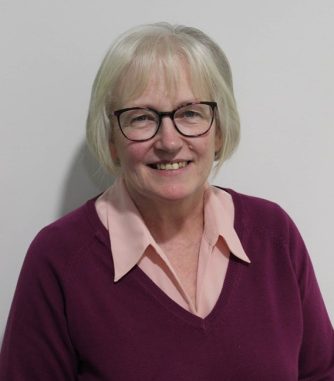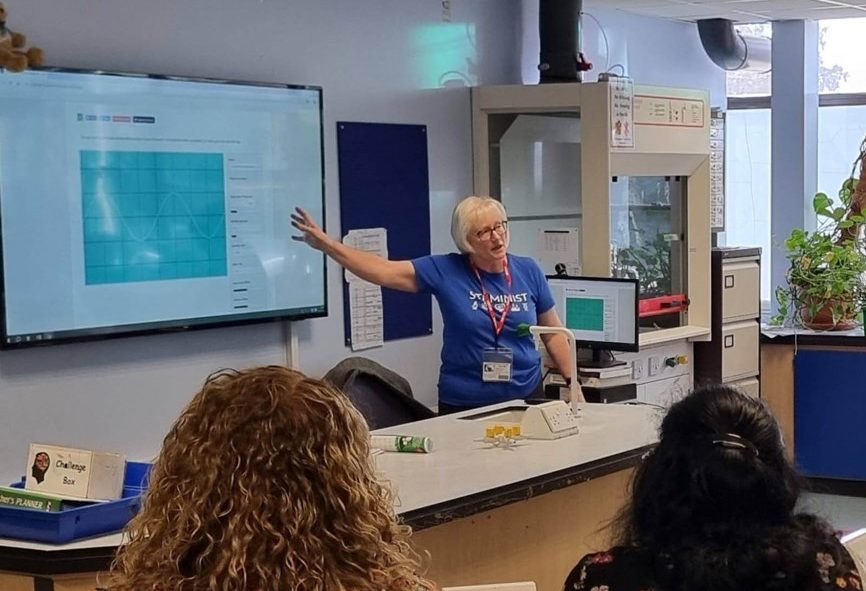Mrs Maureen Wade, The Victory Academy
For creating variations of microscale practical chemistry resources and actively engaging with the wider education community.
 My role in school as a technician involves preparing chemicals and equipment for practical classes for students aged 11 to 19 years across all three sciences. This involves being innovative and adaptive in investigating how practical methods can be used with less risk and less cost but without loss of educational value, creating original resources, demonstrating practical skills, and supporting the science team to deliver a quality science education for all. My role as a professional development leader, both in school and the wider community, enables me to provide advice and instruction to technicians, teachers and other interested parties alike at science events, both locally and nationally, to enhance their own practice. I also provide science tuition for GCSE students in my spare time.
My role in school as a technician involves preparing chemicals and equipment for practical classes for students aged 11 to 19 years across all three sciences. This involves being innovative and adaptive in investigating how practical methods can be used with less risk and less cost but without loss of educational value, creating original resources, demonstrating practical skills, and supporting the science team to deliver a quality science education for all. My role as a professional development leader, both in school and the wider community, enables me to provide advice and instruction to technicians, teachers and other interested parties alike at science events, both locally and nationally, to enhance their own practice. I also provide science tuition for GCSE students in my spare time.
Born and bred in Kent, I left to study applied biosciences at De Montfort University, specialising in analytical biochemistry and toxicology, then moving to the University of Ulster to complete my degree. My first job was for a large pharma working in R&D on calcium channel blockers, followed by a technical position at De Montfort University in pharmaceutical chemistry. Here I started out as undergraduate lab support, and then as a technical demonstrator and a member of the research team. During this time, I took the first big break from my career and returned to employment in an independent school as a biology technician and it was whilst there that I had my second prolonged break. I joined the Victory Academy in 2018 working as a technician across all three sciences.
Throughout my career I have been fortunate to work with some great people and am incredibly lucky to work with our current team who are all enthusiastic educators whilst not taking themselves too seriously. In recent years I have enjoyed becoming involved as a professional development leader, presenting workshops in-house and at science events across the country for the local Science Learning Partnership and the Association for Science Education. These workshops have included microscale chemistry, which I am passionate about and would like to see used more in education. Travelling the country and presenting workshops has enabled me to engage with many like-minded people.
Questions and Answers:
What would be your advice to educators who are working with colleagues going above and beyond, but are yet to nominate them for an RSC Education prize?
Your colleagues have given their time to go above and beyond – please give your time to celebrate that by making a nomination. It will show your appreciation whether they are awarded or not. I don’t know who my nominator is, but the nomination displays a level of regard among those I have worked with for which I am thankful.
How did you first become interested in chemistry or science?
I cannot remember when I first became interested in science, but my interest was fostered by my parents as a child. I still have the small microscope they bought me whilst at junior school and remember the books that were always in the house, the love of the outdoors and wildlife they instilled in us, my dad bringing things home for me that he had found like an old valve radio that I took apart, and my first chemistry set given by family friends.
Who or what has inspired you to have a role in education?
I was never the brightest in the class but loved school as a child, and teachers inspired me to continue studying. I had other jobs when younger but never felt fulfilled. After landing a job in education I knew I wanted to be where people are enquiring and learning. Being in education has allowed me to grow alongside colleagues and students. As educators it is important that we inspire our students through fun and relevant teaching so that they want to continue learning.
What motivates you?
Knowing that every day is an opportunity to make a difference, if only to one person.
What advice would you give to a young person considering a career in chemistry?
Go for it – you will not be sorry. It will be rewarding, you will meet interesting people, travel the world and can make a positive contribution to the future of mankind.
How have your students inspired you?
Our students inspire me with their enthusiasm and their delight when engaged in practical work. I get the biggest buzz when a student knocks on the door to proudly show me their book. Only today I had a ‘high five’ with a student who had previously struggled but was now grading 4 at GCSE – wonderful!
How can good science education support solving global challenges?
The world is full of ongoing issues, and a good science education equips students with a whole toolbox of transferrable skills with which to meet those challenges. By making school science relevant to our students, it helps them see themselves as global scientists. The Victory Academy this year introduced a new topic highlighting local science e.g. Sir John Cornforth’s work on statins that won him the Nobel Prize in Chemistry.
Why is chemistry education important?
Chemistry touches every part of our lives; a chemistry education helps us understand the world around us. I believe those with a good understanding of chemistry have the ability to improve the future for the coming generations.
What has been a highlight for you (either personally or in your career)?
In my career, receiving this award and being able to celebrate with family, friends and great work colleagues, without whom this would not be possible. In my personal life, seeing our children achieve their dreams.
What has been a challenge for you (either personally or in your career)?
The biggest challenge has been making my way back to a career I love after two significant breaks, one to care for family and the second to recover from a serious illness. It is important for people to believe they still have something to offer, whether returning after a break or coming late to the party.
How are the chemical sciences making the world a better place?
Chemistry is pivotal in providing the skills needed to solve world problems and making improvements to our everyday lives, from addressing the challenges of plastics, food production and pollution to pharmaceuticals, fuels and nanotechnology.
Why do you think teamwork is important in science / education?
Great teamwork can create an environment that nurtures students’ ability to reach their full potential. It involves support for each other and everyone feeling that their contribution, no matter how small, is significant and matters; that they have a voice. Of course, it should be remembered that students are also part of the team and that they should be afforded the chance to play their part to ensure successful outcomes.
Who or what has supported you in your career as an educator?
I would not have the career I have had without Tim, my husband of 43 years who has given support throughout in many ways, from driving me to various events to shopping for school practical work. I am grateful for the support of colleagues at The Victory Academy and Thinking Schools Academy Trust. They have given me the time and resources to innovate and leave to attend conferences, and shown respect for the role of technician.
For a bit of fun…..What is your favourite element?
Carbon is my favourite element. Crucial for life, narrator of earth’s history and exists as compounds in all three states. I believe knowledge of carbon chemistry could hold the key to our climate issues.

About the author: Mrs Maureen Wade Winner of the 2024 Excellence in Secondary and Further Education Prize and is a technician at Victory Academy, Kent.
This article has been kindly repurposed from RSC and you can read the original here.
